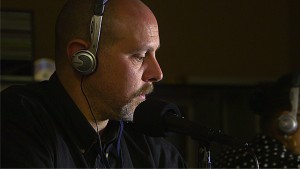



Deacon-structing Love 8: Questions
Deacon Pedro
Sunday, November 12, 2017

Love is such a mystery that it can't be understood in its fullness but it can be understood because we all experience it. Today we address some love questions that you have.
After Last week I received two questions that I would like to address. The first came from Nina Giacona, who writes to us from Atlantic City, NJ.
 Every week, Deacon Pedro takes a particular topic apart, not so much to explore or explain the subject to its fullness, but rather to provide insights that will deepen our understanding of the subject. And don’t worry, at the end of the day he always puts the pieces back together. There are no limits to deaconstructing: Write to him and ask any questions about the faith or Church teaching:[email protected] @deaconpedrogm
Every week, Deacon Pedro takes a particular topic apart, not so much to explore or explain the subject to its fullness, but rather to provide insights that will deepen our understanding of the subject. And don’t worry, at the end of the day he always puts the pieces back together. There are no limits to deaconstructing: Write to him and ask any questions about the faith or Church teaching:[email protected] @deaconpedrogm
Question #1: Love is not our main goal in life
I wrote that a good definition for love is that “love is God.” Then I wrote “we are here on earth with one aim: to get to God” and at the end of the article I added, “love should not be our main goal in life.” Just before I wrote that, I had suggested we think of St. Therese’s Little Way, when we think of working towards holiness through love. Responding to the idea that love should not be our main goal in life, Nina wrote:“NOT?? Taking into consideration the final scripture quote (1 John 4:16) containing the words “God is love” - aren’t the two words interchangeable?” Please explain, as St Therese is my favorite girl.I responded:
Yes - you are right. God is love - but God is much more than love and certainly much more than what our small, human minds can understand as love. If we make that kind of love our goal in life, I believe that we are missing the mark. God should be our goal in life - love is part of that. Does that help?Nina replied:
Yes, that helps. And so does this: “Then, overcome by joy, I cried, 'Jesus, my love. At last I have found my vocation. My vocation is love. In the heart of the Church, my mother, I will be love, and then I will be all things.” ? Thérèse de Lisieux Still, I’m a bit confused.Here’s my response:
Nina - if we were all like St. Therese! She understood love. However, most people don't and make Christianity all about love and only love. It's not. It's about holiness. Living the way of love certainly will lead to holiness, but the end focus must be God. Love is not the end in itself. It is a means to an end. The end is life with God (life with Love). Love has to be anchored by our search and desire for God. That is how St. Therese was able to come up with her conclusion that her vocation was to love. She lived some 20 years of seeking, longing, desiring God before she discovered this vocation (if I remember correctly, she wrote this towards the end of her life). And then she died.Nina replied one last time:
Now THAT explanation I understand! THANK YOU! Yes, she died at 24, and was directed to write her story by her superior (who happened to be her older sister) when she was sick with TB. Gotta love that Therese. Not one erasure or cross-out – she just wrote and wrote. And she was sick. Really sick! And she entered the convent at age 15. I was a dope at age 15. I’m still a dope at 55. What if she hadn’t been directed to write it all down? So many stories of the saints just boggle my mind, but Therese’s is my favorite.Thank you for writing. Sometimes I think that things are really clear, but they are actually not very clear at all. Writing to me to ask questions or challenge me will help me clarify and help us all deepen our understanding of our Faith.
Question #2: Romantic love and homosexuality
I also received another question from an anonymous person:What does the Church tell young people who are homosexual to expect from their lives? Are they called to a life without romantic love if they want to follow Christ’s path?Thank you for asking. It is a very difficult question. First we must understand the Church’s teaching regarding homosexuality clearly: experiencing attractions to people of the same gender is not a sin. However, any sexual behaviour outside of Marriage is. I know that for many this is not a satisfactory answer. I suspect that it’s hard to live in a world that promises that for everyone there is someone else out there and when you meet that person, sparks will fly and the two shall live happily ever after. This is what I referred to as the Myth of Romantic Love. This is a myth. Not everyone is called to Marriage and not everyone is called to romantic love. You do not need to be in a romantic relationship in order to be fulfilled. Anyone who is following the path of holiness by doing all he or she can to avoid sin can follow Christ and live fulfilling lives of wholeness and holiness. Let me clarify that there is not one of us who does not struggle with sin. So, if you struggle with sin, you can still follow Christ’s path! We are all called to follow Christ. Some people are called to say yes to the universal call to holiness through Marriage; others are called to do it through Single lives. Everyone is called to holiness - not everyone is called to marriage or romantic love. The problem, I guess, has to be with how I would define romantic love. I think that by definition, romantic love is ordered towards Marriage and sexual union. I suspect that two people can live together (and love each other) and as long as they are not engaging in any sexual behaviour, they would not be participating in sin. However, can two people who are in a romantic relationship remain celibate? I suppose it’s possible. I would think it’s very difficult. This is why many experts advise people who struggle with same-gender attractions and who want to be chaste – not to get involved in any type of relationships. We must also consider what would be considered "sexual behaviour." Is kissing OK? Is holding hands? Sharing the same bed? This gets tricky when we try to be legalistic about Church teaching. I would say the same to any young (heterosexual) couple that is trying to be chaste. The question is not 'how far we can go' before we actually sin. We also have to always look at Church teaching as something that sets us free, rather than something that shackles us. The Church's teaching on sexuality is saying YES to God's plan for sex and human dignity. The bottom line is that we should not believe that the only way to be fulfilled is to be in a romantic relationship, sexual or not. Here I would add what I told Nina: Life is about holiness. Living the way of love certainly will lead to holiness, but the end focus must be God. Love is not the end in itself. It is a means to an end. The end is life with God. Love has to be anchored by our search and desire for God.
Seek first the Kingdom of God and all these other things will be added unto you. (Matthew 6:33)I hope that this helps. Please, send me your comments and more questions. This is how we grow in Faith.
This is part 8 of a series deacon-structing love. Read the whole series: Part 1: Problems Part 2: Types Part 3: The Family Part 4: The Joy of the Gospel Part 5: Myths Part 6: Joy Part 7: Spiritual Growth
 Every week, Deacon Pedro takes a particular topic apart, not so much to explore or explain the subject to its fullness, but rather to provide insights that will deepen our understanding of the subject. And don’t worry, at the end of the day he always puts the pieces back together. There are no limits to deaconstructing: Write to him and ask any questions about the faith or Church teaching:[email protected] @deaconpedrogm
Every week, Deacon Pedro takes a particular topic apart, not so much to explore or explain the subject to its fullness, but rather to provide insights that will deepen our understanding of the subject. And don’t worry, at the end of the day he always puts the pieces back together. There are no limits to deaconstructing: Write to him and ask any questions about the faith or Church teaching:[email protected] @deaconpedrogmRelated Articles:
<<
SUPPORT LABEL
$50
$100
$150
$250
OTHER AMOUNT
DONATE
Receive our newsletters
Stay Connected
Receive our newsletters

Stay Connected







